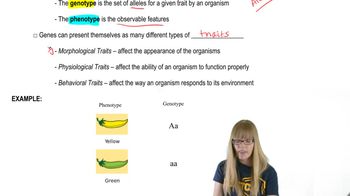Table of contents
- 1. Introduction to Genetics51m
- 2. Mendel's Laws of Inheritance3h 37m
- 3. Extensions to Mendelian Inheritance2h 41m
- 4. Genetic Mapping and Linkage2h 28m
- 5. Genetics of Bacteria and Viruses1h 21m
- 6. Chromosomal Variation1h 48m
- 7. DNA and Chromosome Structure56m
- 8. DNA Replication1h 10m
- 9. Mitosis and Meiosis1h 34m
- 10. Transcription1h 0m
- 11. Translation58m
- 12. Gene Regulation in Prokaryotes1h 19m
- 13. Gene Regulation in Eukaryotes44m
- 14. Genetic Control of Development44m
- 15. Genomes and Genomics1h 50m
- 16. Transposable Elements47m
- 17. Mutation, Repair, and Recombination1h 6m
- 18. Molecular Genetic Tools19m
- 19. Cancer Genetics29m
- 20. Quantitative Genetics1h 26m
- 21. Population Genetics50m
- 22. Evolutionary Genetics29m
1. Introduction to Genetics
Modern Genetics
Problem 2a
Textbook Question
Write a brief essay that discusses the impact of recombinant DNA technology on genetics as we perceive the discipline today.
 Verified step by step guidance
Verified step by step guidance1
Recombinant DNA technology, often referred to as genetic engineering, involves combining DNA from different organisms to create new genetic combinations that are of value to science, medicine, agriculture, and industry.
One of the most significant impacts of recombinant DNA technology is its ability to allow scientists to isolate and manipulate specific genes, leading to advances in understanding gene function and regulation.
This technology has revolutionized the field of genetics by enabling the production of genetically modified organisms (GMOs), which are used in agriculture to improve crop yield and resistance to pests and diseases.
In medicine, recombinant DNA technology has facilitated the development of gene therapy, which aims to treat or prevent diseases by inserting, altering, or removing genes within an individual's cells.
Overall, recombinant DNA technology has expanded the scope of genetics, transforming it from a purely theoretical science into a practical tool with applications across various fields, thereby reshaping our understanding and capabilities within the discipline.
Recommended similar problem, with video answer:
 Verified Solution
Verified SolutionThis video solution was recommended by our tutors as helpful for the problem above
Video duration:
2mPlay a video:
Was this helpful?
Key Concepts
Here are the essential concepts you must grasp in order to answer the question correctly.
Recombinant DNA Technology
Recombinant DNA technology involves combining DNA from different sources to create new genetic combinations. This technique allows scientists to manipulate genes, enabling the insertion of specific traits into organisms. It has revolutionized fields such as medicine, agriculture, and research by facilitating the production of genetically modified organisms (GMOs) and therapeutic proteins.
Recommended video:
Guided course

Recombination after Single Strand Breaks
Genetic Engineering
Genetic engineering is the direct manipulation of an organism's genes using biotechnology. It encompasses various techniques, including recombinant DNA technology, to alter the genetic makeup of organisms. This has significant implications for improving crop yields, developing gene therapies for diseases, and understanding genetic functions, thereby reshaping our approach to genetics.
Recommended video:
Guided course

Descriptive Genetics
Ethical Considerations in Genetics
The advancement of recombinant DNA technology raises important ethical considerations regarding its applications. Issues such as genetic privacy, the potential for designer babies, and the ecological impact of GMOs necessitate careful deliberation. Understanding these ethical implications is crucial for responsible scientific practice and public policy in genetics.
Recommended video:
Guided course

Descriptive Genetics

 9:08m
9:08mWatch next
Master Modern Genetics with a bite sized video explanation from Kylia Goodner
Start learningRelated Videos
Related Practice


